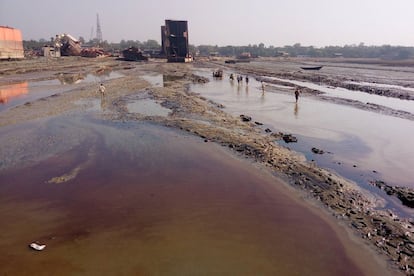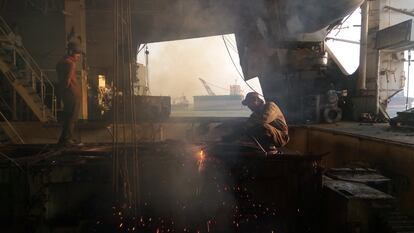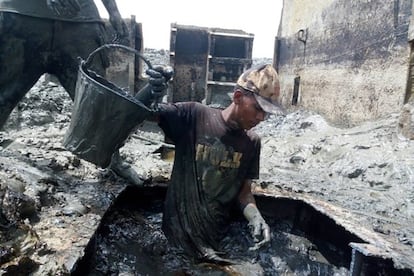Bangladesh’s profitable shipbreaking industry: unprotected workers, polluted beaches and disregarded laws
More than 80% of European and East and Southeast Asian ships end up being dismantled on three Asian beaches to save costs, evading international regulations, in a process that is dangerous for the people and the environment, denounces Human Rights Watch
Rakib was cutting a piece of iron from the wreckage of a boat at a shipbreaking yard in Bangladesh, when suddenly the piece fell, severing his left leg, while an iron rod pierced his stomach. It took his workmates almost an hour to rescue him. He was working in the middle of the night, so there was no transportation. He had to be carried to the nearest hospital, where he was refused treatment due to the severity of his injuries. Finally, they managed to find a car and took him to a larger medical center in Chittagong. The owners of the shipbreaking yard he worked for ordered that he only be given basic care. After a few days, his leg had become gangrenous. His mother had to go into debt so that he could be treated in a private clinic. Since then, the family has been trying in vain to receive some type of compensation from the company. “I’m only 20 years old, and my life is totally ruined by this accident,” Rakib says.
His testimony is one of more than 40 collected by the NGO Human Rights Watch (HRW) in a report published this Thursday in which they denounce that “though most ships were originally owned by European, East Asian, and Southeast Asian companies, the final destination for over 80 percent of all end-of-life ship tonnage is one of three beaches in South Asia: Chattogram in Bangladesh, Alang in India, and Gadani in Pakistan.” The owners of these ships evade international legislation to carry out a process that is cheaper, but unsafe for the environment and for the workers — of whom an estimated 13% are children, reports the NGO.
HRW (which prepared this study in partnership with the NGO Shipbreaking Platform, which provided expert analysis and additional investigations tracking ship movements and transactions) estimates that 30 yards currently operate in Bangladesh, dismantling dozens of ships. “It is a very profitable industry for Bangladesh, especially because much of the recycled steel from the ships is later sold within the country,” explains Julia Bleckner, main researcher of the HRW report, to EL PAÍS. It is a business that, according to the data that was collected for the report, contributes an estimated $2 billion to the country’s economy.
To explain this phenomenon, HRW follows the journey of one of these ships, called the Max, which belonged to the Greek shipping company Tide Line Inc and in the summer of 2021 ended up in Bangladesh, at the Arefin Enterprise shipbreaking yard, which buys boats at the end of their life cycle and dismantles them to sell the metal and other materials. The European Union Waste Shipment Regulation (EUWSR) prohibits the shipment of waste from European Union waters to countries that do not belong to the Organization for Economic Cooperation and Development (OECD). Tide Line Inc — like many European shipping companies — avoided these regulations by selling the Max to a scrap dealer before it was technically considered waste. The new owner took it out of EU waters and placed on it a flag of the Comoros Islands, which are not part of the EU, when the ship was sent for scrapping.

The EU Ship Recycling Regulation (SRR) only applies to ships flagged by an EU state, a rule that companies take advantage of to avoid the legislation. “What European companies do is sell the ship to other companies that then place the so-called flags of convenience,” that is, that of a country other than its owner, explains Bleckner. In addition to the Comoros Islands, there are other nations that are willing to place their flags on these ships; states with no specific regulations for this industry, such as Panama, Liberia, the Marshall Islands or Hong Kong, whose flags fly on more than half of the world’s fleet. Meanwhile, the top ship-owning countries are Greece, China, Japan, Germany and Norway, according to HRW.
Since 2018, the European Union requires all EU-flagged ships to be recycled in a facility approved by the bloc, which is regularly and independently audited to verify compliance with rules on environmental protection and worker safety. None of the shipbreaking yards of Bangladesh have been approved by the Brussels commission audit. “One of the recommendations that we have made to the EU is that this requirement not be applied to the flag of the ships, but rather to the origin of the ship itself,” says the researcher. This would make it illegal for a ship of European origin to be dismantled in this type of yard.
Working barefoot
The frequent injuries and deaths of workers have not deterred many companies from sending their ships to this Asian country, notes the report, for which HRW interviewed two doctors who work in Chattogram and eight experts in ship dismantling and recycling and in the environmental and labor legislation of Bangladesh.
“Labor in Bangladesh’s shipbreaking industry is largely informal, unregulated, and rarely subject to occupational health and safety inspections or controls,” states the investigation. According to HRW, workers at many of the country’s shipbreaking yards cut wires and pipes, blast through ship hulls with blowtorches, climb multiple stories and haul scrap metal, often without adequate protective gear. “Many are killed and seriously injured by explosions, are crushed by falling chunks of steel, and are burned by flammable gases, liquids and other materials in the ships.”

“It feels risky because I know there is no safety for the workers anywhere in this sector. But I have to keep working in the yards, because if I stay at home, who will give me food?” reflects Aarul, 39, who fell from a height of 20 feet while he was working, broke his leg and lost five teeth.
Sohrab, 27, has been working in a shipbreaking yard for eight years. His job is to carry oxygen cylinders weighing approximately 265 pounds each from the ships to the coast. “I only make 200 taka [$1.80] per day, so I cannot afford gumboots that cost 800 taka [$7.25]. I work barefoot. If I ask for safety equipment, the company owners say, ‘if you have a problem, then leave.’”

Many shipbreaking workers are minors. A 2019 survey of Bangladesh shipbreakers estimated that 13% percent of the workforce are children, a finding confirmed by a large number of those interviewed for the HRW report, who said that they started working when they were children. The researchers noted, however, that this figure climbs up to 20% during illegal night shifts. “Child labor is absolutely prohibited in Bangladesh, but this industry is very unregulated, very informal,” condemns Bleckner, who demands that the Bangladeshi government comply with the laws. Specifically, this job “is considered one of the most dangerous for children,” she laments.
For the report, HRW tried to gather testimony from 12 shipping or shipbreaking companies, six flag agencies and three shipbreaking yards, as well as the International Maritime Organization (IMO) and several institutions in Bangladesh, including the Department of Environment, the Ministry of Industries, the Ministry of Labor and Employment and the Bangladesh Ship Recycling Board. It only received responses from the IMO and the shipowning companies AP Moller-Maersk A/S and Novonor and the shipbreaking company Best Oasis Ltd, which requested that its response not be included in the report.
Specifically, the Danish AP Moller-Maersk A/S and the Brazilian Novonor gave explanations regarding the sale of a ship they shared ownership of, the North Sea Producer. This ship was used for 17 years to process oil from the U.K. continental shelf of the North Sea and was sold in 2016 to Dubai-based Global Marketing Systems (GMS), which boasts of having acquired almost half of all the ships that were dismantled in South Asia in 2020. The vessel ended up in a Bangladesh shipbreaking yard. However, local NGOs, particularly the Bangladesh Environmental Lawyers’ Association, pushed for an investigation and found that the radiation levels coming from the ship were “dangerously high.” A judge stopped the scrapping.
“The North Sea Producer was sold and transferred to a buyer in April 2016 on an ‘as is, where is’ basis, whereby the buyer took over operational and legal responsibility for the unit,” the Danish firm stated to avoid responsibilities. Nonetheless, the company explained that it has since stopped selling ships to be scrapped in Bangladesh. Meanwhile, Novonor responded that the purchasing company — which never replied to HRW — clearly failed to comply with the sale contract that required it to observe the environmental legislation. “Shipping companies need to be transparent with the process they follow” when the life cycle of their ships comes to an end, Bleckner claims.
Sign up for our weekly newsletter to get more English-language news coverage from EL PAÍS USA Edition
Tu suscripción se está usando en otro dispositivo
¿Quieres añadir otro usuario a tu suscripción?
Si continúas leyendo en este dispositivo, no se podrá leer en el otro.
FlechaTu suscripción se está usando en otro dispositivo y solo puedes acceder a EL PAÍS desde un dispositivo a la vez.
Si quieres compartir tu cuenta, cambia tu suscripción a la modalidad Premium, así podrás añadir otro usuario. Cada uno accederá con su propia cuenta de email, lo que os permitirá personalizar vuestra experiencia en EL PAÍS.
¿Tienes una suscripción de empresa? Accede aquí para contratar más cuentas.
En el caso de no saber quién está usando tu cuenta, te recomendamos cambiar tu contraseña aquí.
Si decides continuar compartiendo tu cuenta, este mensaje se mostrará en tu dispositivo y en el de la otra persona que está usando tu cuenta de forma indefinida, afectando a tu experiencia de lectura. Puedes consultar aquí los términos y condiciones de la suscripción digital.








































